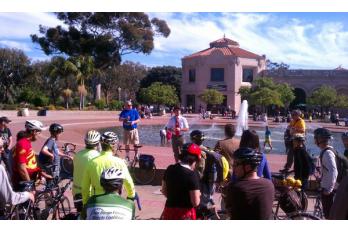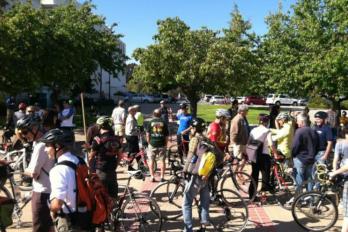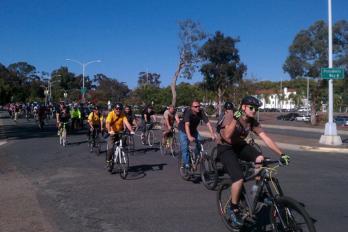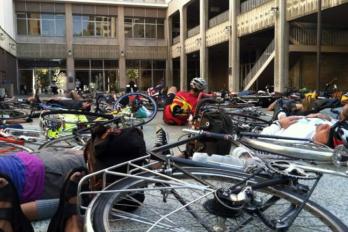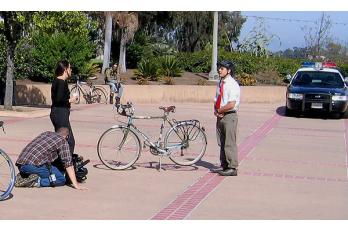TJSL Student Organizes Bicycle Rally at City Hall
April 9, 2012
On April 4, there was a bicycle rally during the evening rush hour to call attention to bicycle safety issues after the recent death of a cyclist. rally organizer, TJSL student Timur Ender, wrote this story:
By Timur Ender, 1L
Last week I heard on the news that cyclist David Ortiz was killed on his way to work. To make matters worse, the police department jumped to conclusions and immediately blamed the cyclist. Except for the location, the police department incorrectly stated every major part of the crash. When the police department incorrectly states that the cyclist was traveling in the wrong direction it has the effect of tainting the image of safe & law abiding cyclists like Mr. Ortiz. We wanted to call attention to this incident that the investigation was done in sloppy manner.
‘
But Mr. Ortiz’s death also highlights the fatal flaws of roadway design. There is no excuse for our city streets to be designed like highways with on & off ramps. When the City designs roads like this the speed limit becomes irrelevant because the road width, by its nature, encourages speeding. Street designs like Balboa Avenue have fatal implications for everyone who doesn’t drive a car as was evidenced by Mr. Ortiz’s death.
We wanted to make the case that our roads are becoming a public health issue. Six cyclists and pedestrians are struck by cars every day in San Diego and these are just the reported (incidents.) These also do not include injuries from car vs. car collisions or car vs. motorcycle. Two vulnerable users (cyclists & pedestrians) die every week in San Diego and about 2,000 vulnerable users are injured every year. These numbers are extraordinarily and unnecessarily high figures. Paris, France for example didn’t have a single bicycle fatality in 2011. This is linked to many factors including: healthy design standards, motorist education, respect for cyclists, policies that encourage bicycling, and enforcement.
We need to treat traffic fatalities the same way the CDC treats obesity: like an epidemic, a virus. We need to address the root causes of the conditions that led to Mr. Ortiz’s death: motorist inattention, poorly designed roadway infrastructure, lack of enforcement, and a lack of awareness of bicycles.
I think the message went through to City Hall. It’s a simple message: bicycles and people lying on the ground. You can’t really make an incorrect inference. It was well-timed, right as people were leaving work and the plaza is extraordinarily well-placed so that 12 floors of offices are able to look down on the plaza. We were sure to be loud upon arrival so that they would know we were there and we had a message.
The City has not promised anything at this point. At the minimum we wanted an apology from the police department for jumping to conclusions and incorrectly blaming the cyclist. It is quite doubtful we will receive a public apology from the police department since they have an image problem as well. When SDPD incorrectly places blame on the cyclist, it ruins a reputation that we work hard to improve everyday on our streets. We try to send the message that bicycles are a legitimate form of transportation and we know how to ride safely and legally in traffic. We are trying to change the mindset that bicycles are just a sport or a toy.
I didn’t know David. I knew that I was upset about how little he could have done to prevent this fatality. No clothing, evasive maneuver, or helmet could have saved him from being run over and killed by 3 different cars. I knew I had to do something to call attention to the multiple factors that contributed to his death.
We are trying to spread awareness about the benefits of bicycling. When there is a community embracement of bicycling, when we shift our roadway design from merely accommodating bicycles to welcoming them, great things can happen. By implementing healthy roadway design we can use our roads to improve the environmental and economic health of our people and cities. By making streets safe for bicycling, we can legitimately mitigate the impacts of climate change, an obesity epidemic, respiratory issues related to polluted air, dependence on foreign oil, rising healthcare costs, a traffic safety epidemic, noise pollution, and traffic congestion. We are trying to spread the message that even a modicum of investment in bicycling infrastructure has tremendous benefits for citizens, cities, and our country.
The event was a success on a personal level for a number of reasons. First, almost a 100 people attended our rally last week. The last time I organized a bike ride in my hometown of Raleigh, NC, 30 people showed up and before that I organized another ride and no one showed up! It’s all about having faith and not being held back by the fear of failure.
But for this event, all I did was send out press releases and set up a Facebook event page and the magic happened. However, after I set up the event page I quickly ran into a problem, I tried to invite people but I ran across the inconvenient obstacle of not having any contacts in San Diego. I just moved here 3 months ago to start law school and I don’t know anyone outside of school. Luckily, the bicycling community embraced the idea and within 2 days of setting up the event we had 1,000 people invited.
It worked out great because almost instantly I made friends with everyone that showed up. Its important to have a life outside of law school and being involved in advocacy events like this allows me to achieve that balance. It is also an invaluable networking opportunity as well which in hindsight, was an unintended benefit.
Overall, the event was a huge success on both a personal and community level. In the coming weeks and months we will keep up pressure on the City, the Police Department, and the mayoral candidates to make sure they understand the tremendous benefits of bicycling and the need for safer roads.
View Timur Ender’s Opinion Piece in the Voice of San Diego
